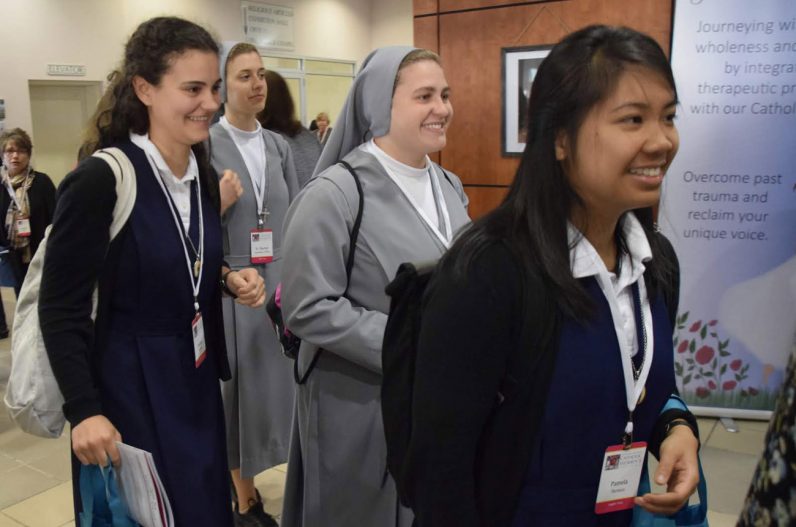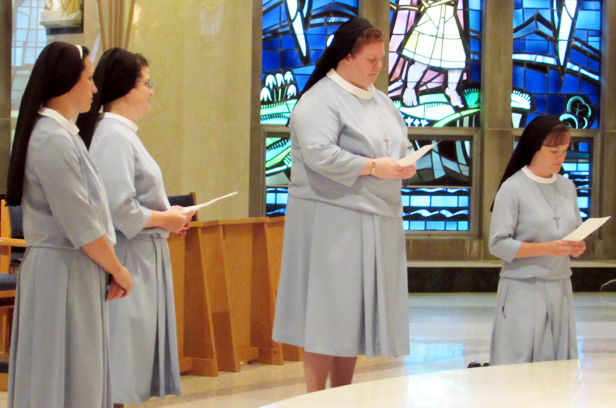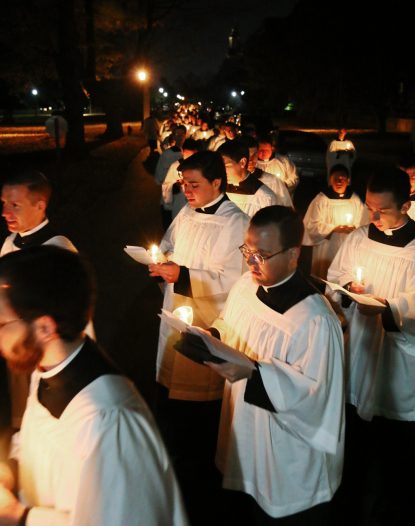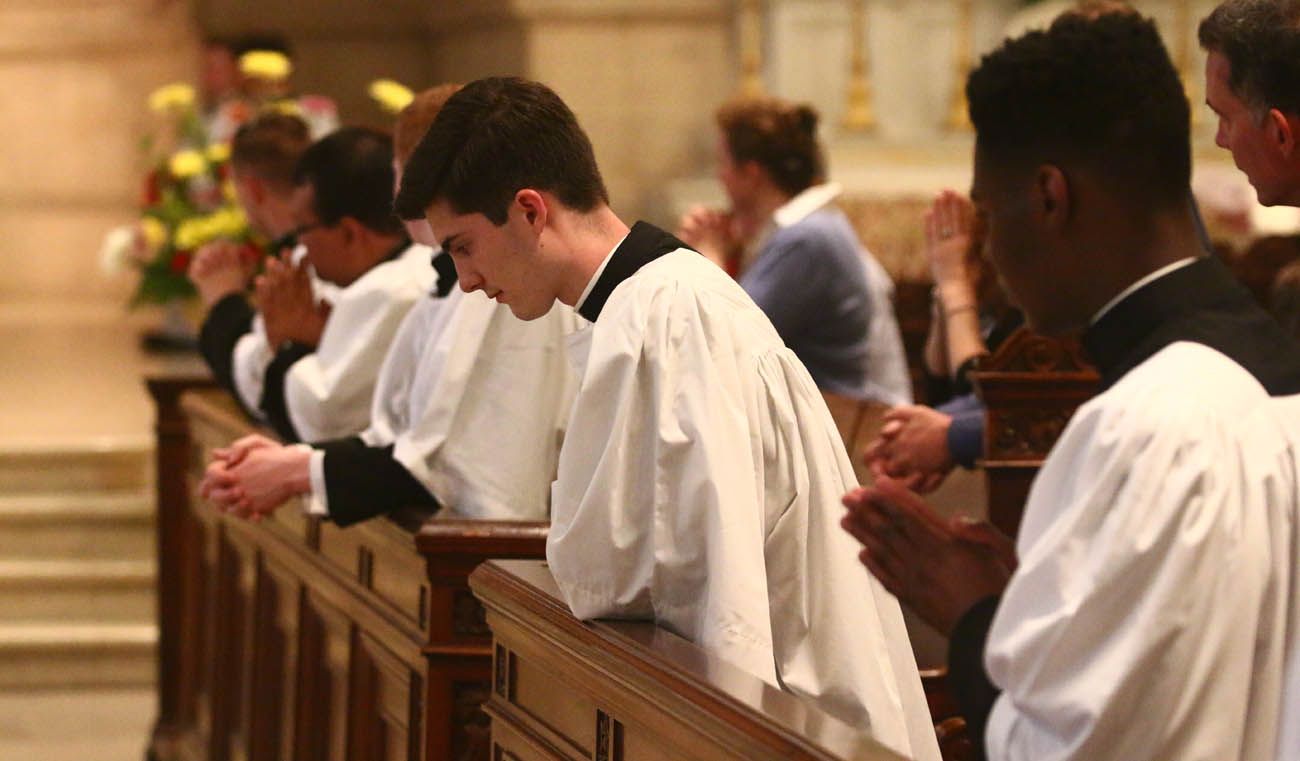
Religious sisters join other women at the Catholic Women’s Conference in October 2019 at the National Shrine of Our Lady of Czestochowa, Doylestown. (Photo by Sarah Webb)
As the Catholic Church in the United States celebrates National Vocation Awareness Week (Nov. 3-9), Father Steven DeLacy looks forward to the day when “religious vocations will come so naturally” that he’ll be out of a job.
“I’m actively trying to eliminate my position,” joked Father DeLacy, who serves as vocation director for the diocesan priesthood in the Archdiocese of Philadelphia.
Since 1976, the U.S. bishops have annually dedicated a week to promoting vocations to the priesthood, diaconate and consecrated life. According to the Center for Applied Research in the Apostolate (CARA), vocations have declined significantly in the U.S. over the past 50 years, with the total number of priests (both diocesan and religious) down by some 38% and the number of religious sisters down 73%.
[hotblock]
Yet creating what St. John Paul II called a “culture of vocation” actually begins with baptism, said Father DeLacy, who pointed to the “three senses of vocation” popularly described by the Diocese of Duluth’s youth director, Father Michael Schmitz.
“We begin with that universal call to holiness, and we recognize that we’re called to be saints here and now,” said Father DeLacy, whose office is based at St. Charles Borromeo Seminary in Wynnewood. “Then we speak of what we typically call vocations, such as priesthood, religious or single life, and marriage. And we also realize that we have a sense of daily vocation, where we ask God, ‘What do you need me to do today?’”
Noisy distractions and college debt
That’s a question often unasked by many people in a highly secularized, individualistic culture, several area formation directors noted.
“We live in a very noisy world, with lots of distractions,” said Vincentian Father John Timlin, who directs his order’s novitiate at St. Vincent Seminary in Philadelphia’s Germantown section.
Continuous use of social media can particularly hinder the ability to discern a call to religious life.
[tower]
“We’ve been trained to eliminate silence in our lives, and to be occupied with mobile devices that are always with us,” said Father DeLacy.
In addition, youth and young adults have become increasingly accustomed to enjoying greater control over their life choices. A range of options can leave them with a real fear of commitment, one that can even persist well into the formal discernment process.
“So many Millennials want everything perfectly lined up before they take the next step,” said Immaculate Heart of Mary Sister Marianne Therese Lallone. “They’re afraid to take that leap of faith.”
Sister Marianne, who directs her order’s vocation office at its Malvern-based motherhouse, attributed some of the risk aversion to “helicopter parenting” that tries to “protect young people in a beautiful bubble.”
Prosperity itself can be a major obstacle as well, said Father Matthew Guckin, director of Catholic mission and identity for the archdiocesan Office of Catechetical Formation.
While material success is not inherently evil, said Father Guckin, “the economy is so strong that it can be hard to see God.”
Finances can also pose a challenge to those who discern a religious vocation after college, with student loan debt still to be repaid.
Father DeLacy noted that his office partners with the Labouré Society, a Minnesota-based nonprofit that provides financial assistance and spiritual support to those who must clear educational loans before entering the priesthood or religious life.
Many orders are willing to extend the discernment period to accommodate those paying off student debt. Father Timlin noted that the Vincentians try to “stay in contact with a person working through” such a process.
Sister Gabrielle Mary Braccio, the archdiocesan delegate for consecrated life, said that her order — the Religious Sisters of Mercy of Alma, Michigan – advised in detail two women who had significant educational debt from studies in computer science and medicine.

Immaculate Heart of Mary Sisters Melissa Mastrangelo, Emily Vincent Rebalsky, Tracey Catherine Uphoff and Carolyn Elizabeth Braun renew their vows at Villa Maria House of Studies, Malvern in this Aug. 12, 2014 file photo. (Sarah Webb)
“They were both so serious and so desirous of entering religious life,” said Sister Gabrielle, adding that “it was amazing to see how the Lord worked” through the women’s repayment efforts, which entailed “initiative and sacrifice.”
Such determination to embrace religious life remains strong, said the formation directors surveyed by CatholicPhilly.com. Even the long-running clerical abuse scandals have not deterred seminary enrollment, which has doubled over the last five years to its current level of 82, said Father DeLacy.
Rather than scrambling to boost their ranks, however, seminaries and religious orders remain focused on the quality, rather than the quantity, of applicants.
“We’re not just out there recruiting and asking, ‘Are you baptized and breathing?’” said Father DeLacy, while Father Timlin agreed that “maybe we won’t have the numbers, but we will have good people of integrity who want to serve.”
Building a path to religious life
Regardless of statistics, all vocations to religious life begin with prayer, said Sister Marianne.
“First and foremost, young people have to have a relationship with Christ,” she said. “They have to have a prayer life, and unless they have that, we can’t talk vocations.”
Eucharistic adoration is a “huge” element in fostering discernment, she said, and Father DeLacy noted that “getting captivated by our eucharistic Lord is one very strong path” to the seminary or convent door.
He also observed that “connecting with Mary and praying the rosary” can encourage young adults to consider religious life, especially since Marian devotion is often “the fruit of good family formation” which in turn supports vocational discernment.
[hotblock2]
Encountering those already in religious life enables young adults to see what a lived vocation looks like, and to take additional steps in the discernment process, such as attending “come and see” weekends and retreats.
Father Timlin said that simply meeting “Vincentian priests who were happy, ordinary people” led him to begin considering a vocation while in high school.
For young women, though, connecting with a desired religious order can be trickier, said Sister Marianne, given the diversity and number of congregations. Many seekers begin by searching online, but such virtual discernment can leave them “overwhelmed and confused,” she said, which is why her order routinely has a presence at area gatherings for young Catholic adults.
Directly asking young men and women to consider religious life is key, said all of the formation directors surveyed by CatholicPhilly.com.

Seminarians join in a eucharistic procession at he close of 40 Hours, Nov. 3, 2019 at St. Charles Borromeo Seminary. (Sarah Webb)
“There is power in the invitation,” said Father DeLacy, who also cited an “ice breaker” effect that often results when one young person at a given parish or school decides to pursue religious life.
“Vocations breed vocations,” he said, noting that archdiocesan high schools such as Bishop Shanahan and, more recently, Father Judge and Lansdale Catholic have seen a number of students enter St. Charles Borromeo Seminary.
He added that several parishes — including St. Joseph in Downington, St. Agnes in West Chester and St. Agnes in Sellersville — have been “very dynamic in producing vocations” among both women and men, something he attributes to “an emphasis on eucharistic adoration, youth ministry and active, engaged priests.”
Along with the other formation directors surveyed, Father DeLacy is hopeful that more young adults will discern religious vocations in the coming years, recognizing the richness of priesthood and consecrated life.
Paraphrasing Pope Francis, Father DeLacy said that “the call from God is not a limiting but a freeing factor.”
He added that for young adults who respond to this divine invitation, “God opens up so many potentialities that they are blessed, and in turn bless the world.”
***
To celebrate National Vocation Awareness Week, the Archdiocese of Philadelphia’s Vocation Office for the Diocesan Priesthood streamed “Ordinary Men: Extraordinary Mission Parts I and II,” on Monday, Nov. 4 and Tuesday, Nov. 5. The Facebook Live videos included panel discussions with archdiocesan priests who shared their individual vocation stories. View the archived videos for Part I and Part II.

Seminarians and parishioners join in prayer at St. Charles Borromeo Seminary in this May 2018 file photo. (Sarah Webb)
PREVIOUS: St. Patrick’s marks 150 years of faith in rural Chester County
NEXT: People with special needs find warm welcome at St. John’s parish



Share this story